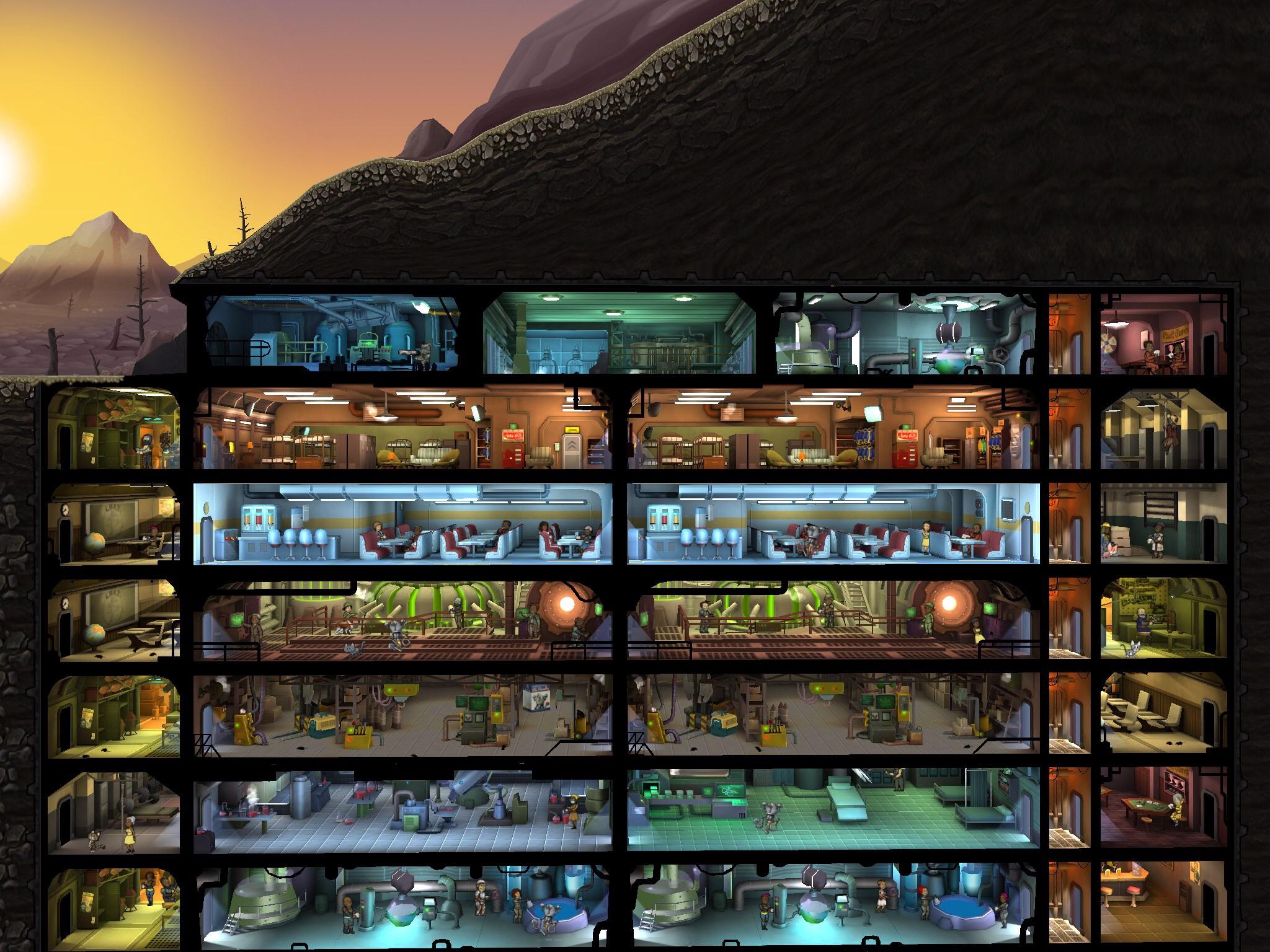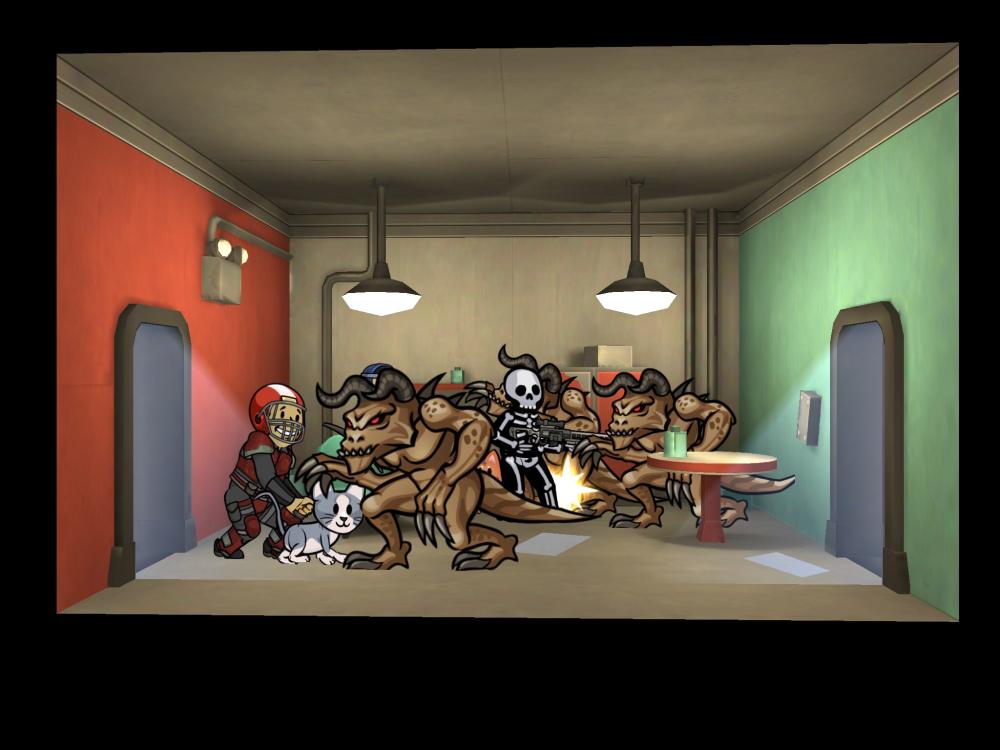Over at Pharyngula, PZ pokes at the simulation hypothesis and finds it wanting.
I’ve never understood how it’s gotten so much traction, anyway. As PZ Says: “That is the wrong question. He asserts The odds we’re in base reality is one in billions.
Instead we should ask, “what simulated ass did you pull those odds out of?”, because he’s got no rational justification for that claim.”

We are all vault-dwellers
The simulation hypothesis is fairly easily refuted by Rich Rosen’s observation: “anything is possible, but very few things actually happen.” The number of possible things that could happen, and won’t, is vastly larger than the number of possible things that could happen, and do. It’s silly to say “because future people might make near infinite numbers simulations, it’s vastly more likely that we are in a simulation” – there are vastly more non-simulation potential futures than there are simulation futures even if we grant that there will be simulation futures. So the argument “it’s likely we’re in a simulation” fails because the simulationist has chosen to ignore the vast number of non-simulation futures and cherry-picks the simulation futures, declaring a tiny subset of all of them “most likely.”
I’ve created (and deleted) about 30 vaults in “Fallout Shelter” yet no philosophers are worrying about the experiences of the dwellers in my games.* Fallout shelter has been downloaded 50 million times (supposedly) if a reasonable number of those players have created a reasonable number of vaults, there have been way more vault dwellers than there are humans on Earth! Thus, the probability is… still not that you’re in a vault. Because there is a vastly more likely probability, namely that the world is as it appears to be. It seems to me that the number of possible futures in which the universe is as it appears to be is vastly larger than the number of possible futures in which philosophers imagine they live in a software simulation. And that number of possible futures is, in turn, even larger than the number of possible futures in which the simulation hypothesis is taken seriously.
The simulation hypothesis is a simple mental hack that takes advantage of our natural inability to effectively imagine large numbers and confuses us by comparing numbers of potential futures to our imagined potential futures. We are limited by our imaginations when we try to imagination “potential futures of mankind” but it’s easy to imagine “simulation” and then treat “simulation” as an ‘implied space’ of infinite size. An implied space, in gaming, is when you create a region that’s an empty region until you look more closely at it: it’s a potential space, a potential future that only gets filled in when it needs to be there. Sort of like how Elite: Dangerous simulates the Milky Way galaxy – there’s no server sitting somewhere with all the maps to all the planets orbiting 300 billion stars – it’s all done with lookup tables into a hash code, and brought into the game’s reality as necessary. The simulationist points at the implied spaces of the simulations and compares their potential size against the actual size of actual reality, but they’re making a false equivalency.
I fact-checked my observation with a Real Mathematician(tm)** and he pointed out that probabalistic arguments are meaningless: any given instance of you is either in a simulation, or isn’t. Probabilities only describe the likely results of tests, which is interesting but doesn’t tell us anything about our current test.

One of the funny things about Fallout Shelter is the goofy smiles on the toons’ faces: they’re programmed to enjoy their lives! Here, my ‘A team’ goes up against a pack of deathclaws – it’s pickaxes and flamers against fangs, horns, and claws! The fun!

Gamespot: Fallout Shelter Reaches 50 Million Players
Walter Jon Williams: Implied Spaces
I’m tempted to argue that the simulation hypothesis would also argue that there’d be a majority of human experiences that were science-fiction or fantasy: I.e.: we’d be orcs in Lord Of The Rings MCVIII more often than we’d be conventional humans. Who would simulate anything as stupid as 2016? Or as irritating as Elon Musk?
The mathematician’s argument is similar to the weak anthropic principle as formulated by Carter: for us to be worrying about how life arose, we exist, and therefore life can arise. For us to be worrying about whether or not we’re in a simulation, maybe we’re the lucky “sims” that exist in the real world. There would be infinities of “sims” that didn’t worry about it at all because the programmer left that capability out.
(* I’m cruel to them, too: I occasionally send them out into the wasteland only armed with a butter knife. “Have fun!” Yahweh-style.)
(** A topologist who can tell the difference between a coffee mug and a donut because one holds coffee. I guess that makes him an experimentalist and not a pure theorist.)

It’s worth remembering that Nick Bostrom originally formulated the idea as a trillema:
Point 2 is the key issue here: there are a very, very large number of potential posthuman civilizations, of which only a relatively small subset will be interested in running “a significant number of simulations of their evolutionary history”*, therefore the fraction of posthuman civilisations running ancestor simulations rounds down to zero.
I also tend to suspect that Nick may not have been entirely serious when he proposed the hypothesis… After sketching out the Jenga tower of suppositions necessary to even begin discussing the idea, he says:
I can’t help but wonder if the whole thing isn’t a joke that got out of hand.
* Your observation about the number of things that could happen but won’t is also relevant here: the overwhelming majority of simulations would be entirely wrong in all important details, and there would be no means of telling which ones are the the tiny minority that get anything even close to right. Therefore, there is absolutely no point in running simulations at the requisite level of detail. There is no equivalent of the Ideal Gas Law for history, because human lives do not average out.
I think that the main reason for the popularity of the simulation hypothesis is cultural – people often conceive of the universe or reality in light of their own technology. As another commenter at Pharyngula pointed out, people in the Bronze Age imagined that The gods had created things by shaping them from clay, because pottery was advanced technology at the time. In the 18th century, when accurate clocks and watches were high tech, people thought of the universe as an elaborate clockwork mechanism created by a divine “watchmaker”. Now that computer simulations are advanced technology, people think of the universe as a computer simulation with a programmer as the equivalent to God. It’s a tendency to not only create God in one’s own image, but to imagine the universe in the image of one’s technology.
Dunc@#1:
I can’t help but wonder if the whole thing isn’t a joke that got out of hand.
I suspect so, as well. Perhaps alcohol was involved.
Point 2 is the key issue here: there are a very, very large number of potential posthuman civilizations, of which only a relatively small subset will be interested in running “a significant number of simulations of their evolutionary history”*, therefore the fraction of posthuman civilisations running ancestor simulations rounds down to zero.
When you slice it apart that way, it doesn’t seem to me that Bostrom could possibly have been serious. Well, with a sufficiently large number of Bostroms, one of them would be serious, but the likelihood that we’ve got the serious one is vanishingly small.
springa73@#2:
It’s a tendency to not only create God in one’s own image, but to imagine the universe in the image of one’s technology.
That seems right, to me.
Semi-tangentially, I remember watching “Buck Rogers” movies with my dad (the old ones from the 30s) and the floating castles were kept in the air by giant furnaces with stokers shovelling radium into them. Because radium was new, and stokers and boilers were understood technology. It’s basically what drives cargo cults.
Dude. If your donut doesn’t hold coffee, you’re not dipping it right.
That’s my first simulation hypothesis LOL. Thanks!
I think I can answer how it got traction in two words: “The Matrix”. When Zhuangzi talked about dreams and butterflys, it all sounded a bit hippy. But update the idea to include leather trenchcoats and bullet time and people will talk about. Even get angry about it, if they’re pompous enough.
Why would you send anyone into the Wasteland with only a butter knife? Why? Why? Why must this be? What within you has done this thing?
The analogy I use for cardinality (usually for explaining the entropic arrow of time to my cat) is sandcastles. How many ways are there to arrange sand grains to make a sandcastle? An enormous number, probably infinite. But how many ways are there to arrange sand without making a sandcastle?
I suppose another argument would be search engines. You can think of possible worlds as the search space, and the propositions required to match the right neighbourhoods as the search terms. Increasing specificity decreases matched area, and the requisite properties and chance outcomes for “universe simulation” make a loooooong list…
In two hundred years there will be three species remaining on planet Earth: humans, cockroaches, and algae. Among humans, there will be a slave class that eats the cockroaches and algae, and a master class that eats the slaves, and all of them will be Christian.
johnhodges@#9:
Don’t be so depressing. The master class will also have a few pet cats, who will eat little dainty slices of slave, too.